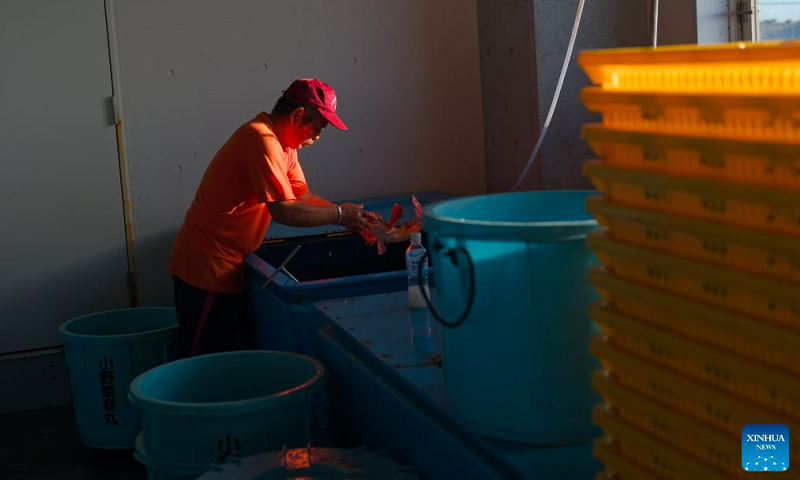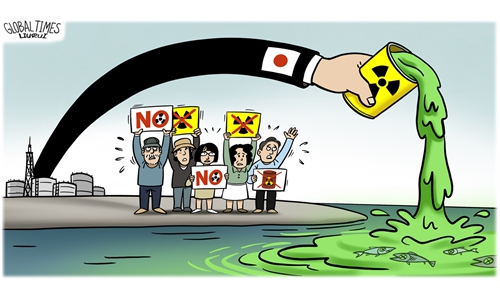
Fisherman Ono Haruo arranges fishes at Tsurishihama Fishing Port in Shinchi Town, Fukushima Prefecture, Japan, Aug. 23, 2023. Japan started releasing nuclear-contaminated wastewater from the crippled Fukushima Daiichi Nuclear Power Plant into the Pacific Ocean on Thursday, despite raging opposition from both at home and abroad. Photo: Xinhua
China's imports of seafood from Japan dropped to zero in September, according to data released by the General Administration of Customs (GAC) on Wednesday. This comes after China has banned all aquatic products from Japan over Fukushima nuclear waste water dumping on August 24.
Data from GAC showed that there were no records of fish and other aquatic invertebrates imported from Japan in September, whereas the figure stood at 149 million yuan ($20.37 million) in August. The figure stood at 2.085 billion yuan during the first eight months of 2023 and remained unchanged from the first nine months, indicating that China did not import any aquatic products from Japan in September.
Additionally there is no recorded data of China importing meat, fish, and other aquatic invertebrate products from Japan in September.
The GAC announced on August 24 that China will halt all aquatic product imports from Japan after the Japanese government, in disregard of the strong criticism and opposition from international community, unilaterally started the dumping of the Fukushima waste water into the ocean.
The move aims to prevent the risk of radioactive contamination caused by the dumping of nuclear-contaminated wastewater from Fukushima to affect food safety, protect the health of Chinese consumers, and ensure the safety of imported food.
According to data from China Chamber of Commerce of Import and Export of Foodstuffs, Native Produce and Animal By-products, China imported $29 million worth of aquatic products and derivatives from Japan in August, a 63 percent decrease year-on-year.
According to a press release from the Japanese Ministry of Foreign Affairs on September 4, Japan told the WTO that China's ban on Japanese seafood is "unacceptable," while asking China to cancel the measures.
In response, Chinese Foreign Ministry said that it is entirely legitimate, reasonable and necessary for the China to take emergency measures against imports of aquatic products from in Japan in accordance with Chinese laws and provisions of WTO agreement.
China's Foreign Ministry spokesperson Wang Wenbin said that China and other stakeholders in the world have the right and responsibility to take legitimate, reasonable and necessary preventive measures to safeguard marine environment, food safety and people's health.
"What Japan should do is to immediately correct its wrongdoing and stop discharging the nuclear-contaminated water into the sea," Wang said.
Despite opposition from Japanese fishermen, neighboring countries, and global environmental experts, Japan started the first round release of the waste water into the ocean on August 24 and the second round release on October 5, sparking massive protests from Asia-Pacific countries.
Russia also adopted temporary restrictive measures against fish and seafood imports from Japan on Monday, Xinhua News Agency reported.
The decision was taken as a "precautionary measure," and the restrictions would stay until Moscow is provided with comprehensive information that confirms the safety of Japanese fish and seafood products.

